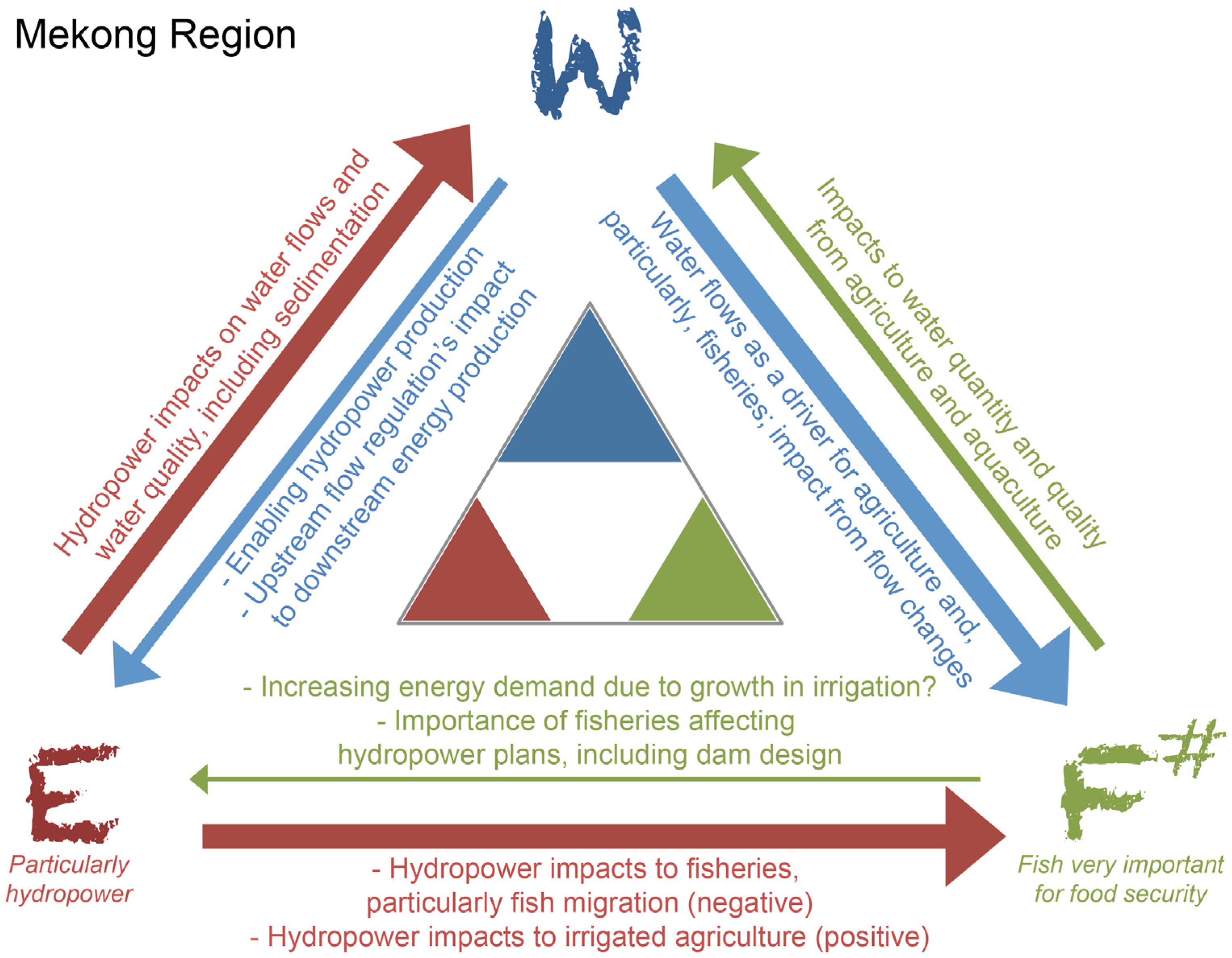Water, Energy, Food
From time to time, I like to read a journal article and share a review. Toward the end of this post you can also find some related and random links.
"The Water-Energy-Food Nexus and the Transboundary Context: Insights from Large Asian Rivers", by Keskinen, Guillaume, Kattelus, Porkka, Räsänen, and Varis from Aalto University in Finland, was published in Water (an open-access journal) in 2016.
Here is the Abstract:
The water-energy-food nexus is a topical subject for research and practice, reflecting the importance of these sectors for humankind and the complexity and magnitude of the challenges they are facing. While the nexus as a concept is not yet mature or fully tested in practice, it has already encouraged a range of approaches in a variety of contexts. This article provides a set of definitions recognizing three perspectives that see the nexus as an analytical tool, governance framework and as an emerging discourse. It discusses the implications that an international transboundary context brings to the nexus and vice versa. Based on a comparative analysis of three Asian regions—Central Asia, South Asia and the Mekong Region—and their related transboundary river basins, we propose that the transboundary context has three major implications: diversity of scales and perspectives, importance of state actors and importance of politics. Similarly, introducing the nexus as an approach in a transboundary context has a potential to provide new resources and approaches, alter existing actor dynamics and portray a richer picture of relationships. Overall, the significance of water-energy-food linkages and their direct impacts on water allocation mean that the nexus has the potential to complement existing approaches also in the transboundary river basins.
The water-energy nexus has been a topic on this blog before; including food is an increasing trend. Here is the definition the authors give:
Water, energy and food are the key prerequisites for our existence, there is no life without them. They are also closely linked with water acting commonly as an enabler and in the areas of water scarcity, limiter for food and energy production. Globally, food production comprises the great majority of consumptive water use , while the most important renewable energy production types in particular, including hydropower, bioenergy and waste, are dependent on water. Hence, the idea of looking at these three aspects and their connections together is in no way new.
This journal article looks at the water-energy-food nexus from three perspectives, applies it to three transboundary (i.e. where a watershed is shared by multiple countries) regions, then considers a few implications. The perspectives that the authors consider are using the nexus concept defined above as an analytical tool (quantitative or qualitative), a governance framework, and a way of framing discussions about problems facing these resources. Applying a nexus-based analysis to three regions—Central Asia, South Asia, and South-East Asia—forms the core of this paper. Finally, the authors consider some implications of transboundary scenarios on nexus-based analysis and governance. Nexus analysis is complicated by the need to consider multiple scales (e.g. both watershed and political boundaries) and the role of politics and state actors. Conversely, the holistic nature of nexus-based analysis can open up new approaches in areas where there is competition over scarce water resources by bringing food and energy interests to the table as well.
In this post, I'm going to focus on one transboundary region discussed in the paper. The Mekong River watershed in Southeast Asia is shared by six countries including Vietnam, Cambodia, and China. Each region examined in this paper had a figure like the following to summarize the most significant impacts between water, energy, and food. The width of the lines denotes the importance of the impact indicated. In the case of South East Asia, the construction of hydroelectic dams can interfere with fish migration as well as flow patterns, which further impact fisheries. Apparently the Mekong River is "one of the world's most productive inland fisheries" so the impact of hydropower development on fisheries there makes it a very relevant example of the water-energy-food nexus.

(this figure belongs to the authors/journal and is included for review and discussion purposes only)
The interaction between the elements of the nexus is different in each region. The summary figures like the one included above are effective at showing the regional similarities and differences.
The authors made a couple of really good points. One is that the concept of the water-energy-food nexus should also include major crops that are not used for food or energy, such as cotton in Uzbekistan. Another is that the boundaries for each element in the nexus are different: a watershed is a good scale to look at water issues, but an interconnected electrical transmission grid might be more appropriate for energy, while food is traded globally in modern times.
This journal article was quite clear to follow (especially with the effective figures that were included) and includes copious references.
There was a conference in Fredericton last week that relates to the inter-relationship between water, energy, and agri-/aqua-/silvi-culture: the Atlantic Biorefinery Conference. I didn't attend myself, but some of my colleagues were involved. Here is an article and a radio interview (both en français) that mention the company I work for.
The conference was held at the Hugh John Flemming Forestry Centre, which has a driveway that connects to Knowledge Park, an IT office park. This physical proximity illustrates how the intersection of natural resources and high tech is now an important part of the NB economy. An infographic I shared in the past makes a similar point.
On an unrelated note, here are a few links that relate to some of my previous posts:
-
This article has a lot of overlap with a book I reviewed recently.
-
I came across this art of Burpee Bar Island (which I kayaked to a couple of weeks ago).
-
Finally, Orphan Black, a TV show I've written about before, began its final season this weekend.